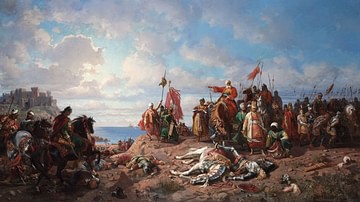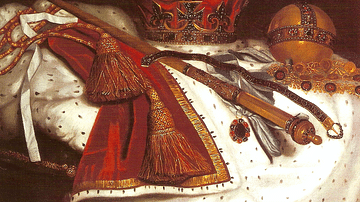Review

| Rating: | |
|---|---|
| Title: | Dangerous Gifts: Imperialism, Security, and Civil Wars in the Levant, 1798-1864 |
| Author: | Ozan Ozavci |
| Audience: | University |
| Difficulty: | Medium |
| Publisher: | Oxford University Press |
| Published: | 2021 |
| Pages: | 416 |
Set in the late Ottoman Middle East, 'Dangerous Gifts' contrasts the 'humanitarian' justifications for imperial interventions given by European colonial powers with the grim reality. Ozavci looks at not only the Europeans' actions but also the local actors who used the squabbling of the ‘Great Powers’ to their benefit. His wide scope allows him to connect disparate events thematically but makes the book slightly less accessible to non-experts, as the chronology of events is not always clear.
As Assistant Professor of History at Utrecht University, Ozan Ozavci focuses on the twilight of the Ottoman Empire, a period when its European rivals intervened, economically and militarily, in Ottoman affairs. As a professor of Transimperial History, Ozavci's book is international in scope, covering British, French, and Ottoman imperial projects in equal measure. To that end, he draws on material from Turkish, Arabic, and numerous European archives in order to examine the late-Ottoman period from an internationalist perspective. European empires, particularly in the long 19th century, were fixated on the fate of the Ottoman Empire. The so-called "Eastern Question" emerged from this period, as the Europeans questioned what was to be done with the ‘decaying’ Ottoman imperium. Ozavci inverts this common understanding, bringing Ottoman and local actors to the fore, as they too attempted to deal with the crises in the region.
The work is divided into three parts. The first, ‘Avant le mot’, discusses the state of European intervention prior to the formation of the 'Eastern Question' as a topic of explicit debate. French imperialism also comes into focus here, as Ozavci recounts Ottoman reactions to the Napoleonic invasion of Egypt in 1798. Part II focuses on the 'Eastern Question' itself and the imperial politics developing in tandem in Istanbul and Vienna. Ozavci argues that both capitals attempted to shore up the integrity of the Ottoman Empire, whether in the interest of self-preservation or in maintaining the balance of power in Europe. Part III, aptly titled 'The Mountain', looks to Mount Lebanon. This is where Ozavci's attention to local actors shines. In his focus on the 1840 intervention, he not only examines the actions of the imperial powers, but the Jumblatts, the well-known Lebanese Druze family. This book also includes four maps and translations of primary sources. Ozavci's account shows exactly how the Jumblatts were able to take advantage of imperial rivalries in 1840. He understands the moment of 1840 as simultaneously an imperial intervention and a civil war.
This period of imperial intervention is best understood through what Ozavci refers to as a 'culture of security'. Imperial forces enacted violence and imperial ideologies with the goal of pursuing the 'anticipated state of being unharmed in the future' (5). The initial intervention of European powers into the Ottoman Empire came in the form of capitulations, the various legal agreements through which Europeans were able to interfere in the economy of the Ottoman Empire. In an attempt to solve the 'Eastern Question', Ozavci argues that Europeans were dedicated to preserving a weakened form of the Ottoman Empire, one from which they could draw benefits in the form of capitulations. He goes on to say that this logic led to the development of a justification for imperial occupation and intervention which still functions today: humanitarianism. Incredible military power, naval deployments, and security institutions were established to this end. However, none of this can be understood without taking into consideration local ideas and practices of security.
Ozavci’s conclusion is forward-looking and addresses the question: What does European imperialism in the late Ottoman period tell us about modern ventures? He discusses how the title of the book is drawn from The Foreigner's Gift: The Americans, the Arabs and the Iraqis in Iraq (2006) by Fouad Ajami. Ozavci ends the book by making the comparison between Ajami’s book and his own explicit: European (and, in the case of Iraq, American) imperial powers present themselves as saviors, seeking to aid the Middle East. Their gifts (of security, trade, etc.) are poisonous and merely a means to an end. While Ajami hails the Americans as liberators and their 'gifts' as legitimate, Ozavci critiques this view of humanitarian interventions, whether in 2003 or 1840. For Ozavci, humanitarian ideological justifications are the velvet glove over the iron fist of imperialism.
About the Reviewer
Cite This Work
APA Style
Avanzato, M. (2023, July 07). Dangerous Gifts: Imperialism, Security, and Civil Wars in the Levant, 1798-1864. World History Encyclopedia. Retrieved from https://www.worldhistory.org/review/374/dangerous-gifts-imperialism-security-and-civil-war/
Chicago Style
Avanzato, Michael. "Dangerous Gifts: Imperialism, Security, and Civil Wars in the Levant, 1798-1864." World History Encyclopedia. Last modified July 07, 2023. https://www.worldhistory.org/review/374/dangerous-gifts-imperialism-security-and-civil-war/.
MLA Style
Avanzato, Michael. "Dangerous Gifts: Imperialism, Security, and Civil Wars in the Levant, 1798-1864." World History Encyclopedia. World History Encyclopedia, 07 Jul 2023, https://www.worldhistory.org/review/374/dangerous-gifts-imperialism-security-and-civil-war/. Web. 23 Apr 2025.




